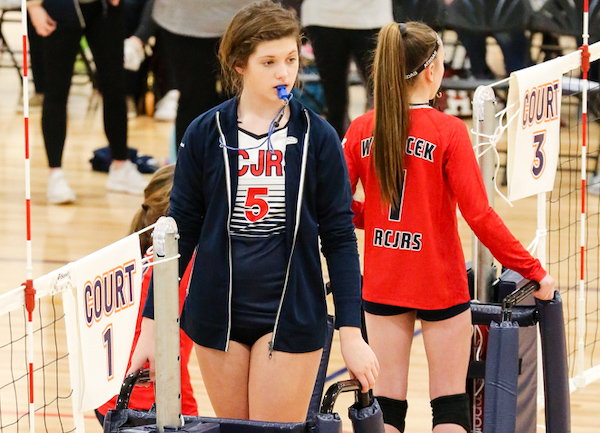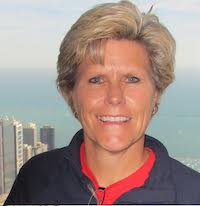Once tournament play begins, it is apparent which clubs have done their due diligence to train and prepare the athletes for their work team responsibilities, and which ones have not spent the time. Every director should make it a priority to train your athletes to officiate and keep score/book.
It is highly recommended to bring in a certified Official to run your club’s training. River City Juniors in Omaha, Nebraska designates an entire day of training officiating/work team duties to their teams. The club happens to have trained and experienced Officials on staff, one who is nationally certified in referee and scorekeeping, plus the Club Director, Deb Grafentin, who officiated at the collegiate level or a few years, and another coach who scored collegiate matches for 6 years.
River City has followed a specific Official and Scorekeeper training schedule for nearly 20 years.
Training Schedule:
The weekend before RCJ starts competition, the club hosts a Picture and Scrimmage Day. HERE is the itinerary for the day, basic itinerary is below.
9:00-10:30 AM: Team Photos and Big Sis/Lil Sis Meet and Greet.
- A local photography company supplies team and individual photos first thing in the morning, as well as custom items parents can pre-order.
- When teams are not taking their team pic or meeting, athletes will meet with their “sis”. Athletes are encouraged to give their “sis” an inspirational quote or get to know her better.
- Coaches are there to help their athletes connect with their “sis” and meet players that are on the other team.
10:30-11:30 AM: Teams participate in an Officiating Clinic to learn proper protocol for R1, R2, Line judging and Scorekeeping.
Teams divide into 2 groups: one for Scorekeeping and one for R1 & R2s. 17s and 18s are the on-court demonstrators for the R1/R2 dry run.
- Each team divides into two groups because this way the athletes become more proficient at their task. There are some athletes who should not be an R1 because they fear being on the stand and possibly getting yelled at, so RCJ views work team roles just like positions and their strength. Some athletes are more capable to be a setter vs being a middle, as there are individuals who are more capable with a whistle and some that are better at the book.
- Each group goes to their respective training and learns the mechanics of what needs to happen.
- Each team at RCJ has two coaches. Each coach must pick scoring or officiating to master. Each coach that has a strength now is the coach those players can rely on for additional help. Example: Deb handles all officiating for her team and Aimee, the Assistant Coach, handles all scorekeeping.
11:30 AM-12:00 PM: Lunch Break.
12:00-4:00 PM: Scrimmage. HERE is the Sample Scrimmage Schedule.
- Just prior to the scrimmage we have 12 coaches go on the court to replicate certain unique situations that may take place in a match. For example: back row attacks, a libero setting in front of 10’ line, four touches vs two touches on the spike that didn’t go over.
- One team is the work team for each scrimmage. Older teams help the younger teams by standing with the line judges and R1s and R2s to help them with their mechanics. Younger teams will have at least two work duties for additional practice.
- Coaches can stop play at anytime to fix/adjust/teach what could/should have been called.
Benefits of the Officiating and Scorekeeper Training
Deb and her staff have seen direct benefits of the training on her athletes and parents year after year.
- Creates confidence in the athletes when it is tournament time because the athletes feel prepared and they know the coaches are there to help.
- Instills pride in the athletes. We make it a point to have any team who has a real R1 working the match and that R1 lets us know we did a great job. RCJ teams are complimented often, which boosts the athletes’ pride.
- Fewer parent issues. We have parents watch how we teach so they respect what we are doing and can understand what their child is learning and how it will apply. When a parent from our club says something they shouldn’t, another parent will immediately to that parent and say this is not the River City way of doing things, or the other parent will let their coach or Club Director know so it can be handled directly with the parent that acted out.
River City Juniors is a long time member of the Junior Volleyball Association. To learn more about a JVA membership click HERE. For more resources for Club Directors click HERE.
About the Author
Deb Grafentin is the Club Director of River City Juniors. The 37 year veteran coach is the main Master Coach for all age groups and all teams.













